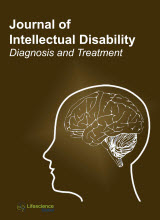jiddt
|
|
Abstract: Objective: This paper is directed at development and experimentally test the effectiveness of the system of socio-pedagogical support of socialization of the individual; determining the pedagogical conditions for ensuring the harmonious socialization of children in preschool education. The basis of the analysis of the project of social and pedagogical support of the child’s socialization is its humanitarian direction. Keywords: Process of socialization, socialization of children, preschool childhood, socio-pedagogical support, child’s personality, pedagogical process.
|
|
|
Abstract: Objective: The purpose of this work is to study the characteristics of communication in children with intellectual disabilities. Keywords: Intellectual impairment, mental retardation, social interaction, social adaptation, non-verbal communication, verbal communication.
|
|
|
Abstract: Objective: The student's humanistic position is not only the result of the teacher's personal influence but also a controlled process. As a result of the implementation of this process, the student receives an understanding of what should relate to the humanistic process and the humanistic function of society. Keywords: Humanism, position, training, students, university.
|
|
|
Abstract: The formation of spiritual culture should be based on the principles that guide every teacher in the implementation of their pedagogical skills in direct learning. The purpose of our study is to substantiate that young teachers' social maturity is characterized not only by the level of knowledge, development of their orientations but also by the degree of personal spiritual culture. We have applied the method of diagnosing a level of young teacher's social maturity development as a moderator in the search for spiritual values, but also a participant in the formation of personal spiritual culture directly at the student himself. Diagnostic sections have shown that the index of general social maturity of young teachers who shape the spiritual culture of students, is growing much faster compared to the young teachers who didn't show the activity of this kind. From the experimental data, it follows that young teachers' activity in creating a pedagogical environment of their school is an effective factor in the intensification of their social maturity formation. Investigating the problem of the formation of social maturity of the individual, a certain system of personal orientations develops, which serves as the basis of spiritual culture, which the student can choose. The authors show that such an opportunity can only be implemented with the teacher's integrated participation as a carrier of moral values. The study's novelty is determined by the fact that each of the participants in the educational process seeks to realize the share and type of moral views for the fulfillment of their personal interests. The study's practical significance is determined by the fact that spiritual culture can be based not only on its private but also on its public perception. Keywords: Social relations assimilation, level of knowledge, spiritual culture, pedagogical environment.
|
|
|
Abstract: Breast cancer is the most common cancer and a common cause of death, which occurs due to cancer among women in the world. Cancer cells need a lot of energy to their uncontrolled growth, so it seems that the expression of the enzyme in the Krebs cycle is changing. There are some reports about mutations and altered expression of succinate dehydrogenase, fumarate Hydratase, and isocitrate dehydrogenase in human cancers. This research aimed to investigate the role of magnetite nanoparticle Oleuropein on the Krebs cycle proteins expression on the breast cancer cell line. Oleuropein is one of the polyphenolic components in olive trees and has some benefits in some diseases, including cancer. In addition to testing the viability test MTT (3- 4,5 Dimethylthiazol-2-yl -2,5-diphenyltetrazolium bromide) assay, in three levels of Oleuropein 0ppm, 300ppm, 600ppm proteomics analysis was also performed in cell line MCF7 in this study. The results of differential protein spots identification into two-dimensional electrophoresis and matrix-assisted laser desorption/ionization time-of-flight mass spectrometry (MS-MALDI-TOF-TOF), showed that fumarylacetoacetate hydrolase, succinate-coenzyme A ligase and isocitrate dehydrogenase1 are differential proteins upregulated after treated with 300ppm and 600ppm of oleuropein. It seems that Nano Oleuropein is a booster of Krebs cycle with upregulation of Fumarylacetoacetase, succinate-CoA ligase, and isocitrate dehydrogenase1. Uncoordinated Overexpression of some Krebs cycle protein can be one of the inhibition mechanisms on the breast cancer cell line under Oleuropein treatment. Keywords: Breast cancer, Oleuropein, Krebs cycle, Proteomics.
|


